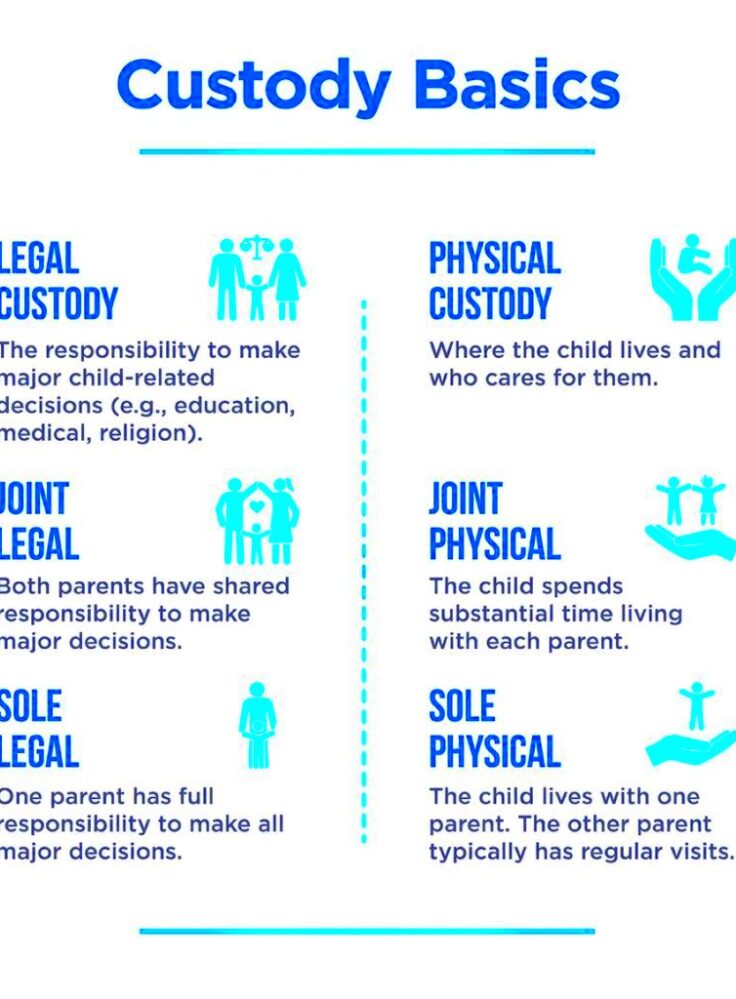Child Custody and Parental Rights Law Revisions in Colorado
In Colorado, the best interests of the child are taken into consideration regarding custody laws. This can be an emotional and difficult process for parents when they separate or divorce in deciding on custody. Becoming familiar with these laws will guide parents through the entire procedure.
There are two principal types of custody recognized by Colorado:
- Legal Custody: This refers to the right to make important decisions about a child’s life, including education, healthcare, and religion.
- Physical Custody: This determines where the child lives. A parent with physical custody has the child living with them for the majority of the time.
Shared custody arrangements are usually preferred by Colorado courts that allow both parents to continue having presence in their children’s lives. The intention is to promote relationship between the two parents if it can be done. Factors like: when it comes to deciding about custody, judges take into account different factors:
- Each parent’s ability to provide for the child’s needs
- The child’s preferences, depending on their age and maturity
- The relationship between the child and each parent
- Any history of domestic violence or substance abuse
Overview of Parental Rights

Parental rights in Colorado mean the legal rights and responsibilities that a parent holds on their child. With these rights, parents can be involved in important decisions about their child’s life. In Colorado, these rights are accepted in the case of both married and unmarried parents.
Essential parental rights comprise:
- The right to make decisions about the child’s education and health care
- The right to access the child’s medical and educational records
- The right to participate in legal proceedings affecting the child
- The right to seek modifications to custody or parenting time arrangements
Parents must be aware of the fact that these rights can be tailored in a court of law for the sake of the child. Moreover, usually both parents possess such rights notwithstanding that one of them is in charge all by himself or herself.
Recent Revisions to Child Custody Laws
The aim of recent modifications made in laws concerning child custody in Colorado is to ensure that the system is made fairer while taking care of the children’s necessities. Therefore, by understanding these changes, parents can have an easier time while dealing with their custody agreements.
Some considerable modifications are as follows:
- Emphasis on Parenting Plans: Courts now encourage parents to develop comprehensive parenting plans that outline custody, visitation schedules, and decision-making processes.
- Modification of Parenting Time: New guidelines simplify how parents can request modifications to parenting time, making the process more accessible.
- Support for Alternative Dispute Resolution: The law promotes mediation as a first step in custody disputes, helping parents resolve issues amicably.
- Increased Focus on Child’s Well-Being: Changes emphasize the child’s emotional and psychological well-being, ensuring their needs are prioritized during custody decisions.
Styles for family modifications in Colorado demonstrate the state’s endeavor to create an enabling environment for kids. Parents will have clarity and confidence when dealing with custody issues if they understand these amendments.
Factors Influencing Custody Decisions
When it comes down to determining custody in Colorado, many factors play an important role in the decision. The main purpose of the court is to ensure that the best interests of the child are taken into account. Parents can prepare for custody evaluations and talks if they understand such factors
In terms of custody choices and verdicts, these are some important elements to consider:
- The Child’s Needs: Courts prioritize the physical and emotional needs of the child, considering their age, health, and overall well-being.
- Parental Relationships: The strength of the relationship between the child and each parent is a significant factor. Courts look for evidence of nurturing and support.
- Parental Capacity: Each parent’s ability to provide a stable, loving environment is assessed. This includes evaluating each parent’s financial stability and lifestyle.
- History of Domestic Violence: Any history of abuse or violence is taken very seriously, and courts will work to ensure the child’s safety.
- Child’s Preference: Depending on the child’s age and maturity, their wishes may be considered in custody decisions.
The factors are ultimately weighed by the courts before making a decision, which aims at serving the best interests of child and thus be a conducive atmosphere for them to thrive.
Impact of Revisions on Parents and Children
Recently, amendments in child custody laws have tremendous effects on guardians and minors in Colorado. This is an attempt to develop a fairer system as well as giving help when families are passing through tough phase of their lives.
The revisions have brought some positive changes such as the following:
- Better Communication: The focus on developing parenting plans encourages parents to communicate effectively about their child’s needs and schedules.
- Increased Involvement: By promoting shared parenting, revisions allow both parents to be more involved in their child’s life, fostering stronger relationships.
- Support for Mediation: Encouraging mediation helps reduce conflict and leads to more amicable solutions, benefiting everyone involved, especially the child.
- Child-Centric Approach: The laws now emphasize the emotional well-being of the child, ensuring their needs come first in custody decisions.
This whole bunch of amendments is determinative towards family related harmony, thereby enabling parents to work as a team in order to benefit their children.
Dispute Resolution in Custody Cases
Hence, there exists a requirement for such resolution in all child custody matters within the state of Colorado. The emotional stakes are high hence the need for a resolution that meets everyone’s expectations and requirement. In Colorado law system, one approach to addressing conflict is by the rule of mediation and negotiation other than allowing for lengthy litigation.
As there are divergent methods for resolving disputes in custody cases, below are some of them:
- Mediation: This is often the first step in resolving custody disputes. A neutral mediator helps parents discuss their issues and reach a mutually agreeable solution.
- Collaborative Law: In this approach, both parties work together with their attorneys to negotiate custody arrangements outside of court.
- Arbitration: If mediation fails, parents may choose arbitration, where a neutral third party makes binding decisions on custody and parenting time.
- Litigation: As a last resort, parents can take their case to court. A judge will review the evidence and make a final decision regarding custody.
Although going to court can consume a lot of time and money, other options for resolving disputes are usually more favorable. Such approaches enable parents to work together and place their child’s interests first, thus becoming less strained through custody fights.
Resources for Parents Navigating Custody Issues
Parental duties can become stressful periodically, especially when there are feelings involved. Luckily enough, one can always look at different platforms that guide them in the process. Some of these include:
- Legal Aid Services: Many organizations offer free or low-cost legal assistance for parents facing custody challenges. These services can help you understand your rights and prepare your case.
- Mediation Services: Local mediation centers provide trained professionals who can help parents reach amicable agreements without going to court. This approach fosters communication and collaboration.
- Parenting Classes: Many community centers and organizations offer parenting classes focusing on co-parenting strategies and effective communication skills, which can benefit both parents and children.
- Support Groups: Connecting with other parents in similar situations can provide emotional support and practical advice. Look for local or online support groups focused on custody issues.
- State Resources: The Colorado Judicial Branch website provides helpful information about custody laws, forms, and processes, making it easier for parents to navigate the legal system.
In order to enhance the ability of making informed decisions and ultimately achieve a good outcome, parents can utilize these materials at their disposal. It’s important to keep in mind that you do not have to face this alone.
(Note: Always remember that you don’t have to go through this process on your own!)
Future Considerations for Child Custody Laws
Due to constant changes in child custody law, it’s important for parents to be abreast of what lies ahead so that they can anticipate any sensational twists that could affect their lives. Below are some trails and potential future ramifications of decree:
- Increased Focus on Shared Parenting: As awareness grows about the benefits of shared parenting, future laws may continue to emphasize equal involvement from both parents.
- Impact of Technology: With the rise of virtual communication tools, future custody arrangements may include more flexible schedules, enabling children to maintain connections with both parents.
- Emphasis on Mental Health: There’s a growing recognition of the importance of mental health in custody decisions. Future laws may incorporate mental health evaluations for parents to ensure the child’s emotional well-being.
- Advancements in Dispute Resolution: Expect further developments in mediation and collaborative law practices, which may become more standardized to minimize conflict and promote cooperation.
These are some important things that can help a parent in better understanding the changes in law and advocate for their child’s best interest in future.
FAQs about Child Custody and Parental Rights
The question of custody and parental rights is indeed a complex one for parents. The following are some frequently asked questions that address common concerns that parents have:
- What is the difference between legal custody and physical custody? Legal custody involves decision-making authority for the child’s upbringing, while physical custody determines where the child lives.
- Can a child express their preference for custody? Yes, depending on their age and maturity, a child’s preference may be considered during custody hearings.
- How can I modify a custody agreement? To modify a custody agreement, you typically need to demonstrate a significant change in circumstances and file a petition with the court.
- What happens if one parent violates a custody order? If a custody order is violated, the affected parent can file a motion with the court, which may lead to enforcement actions or modifications of the order.
- Are parental rights the same for unmarried parents? Yes, unmarried parents have the same rights as married parents, but establishing those rights may require legal action.
In-depth comprehension of these dimensions can enable guardians to confidently maneuver through the intricate maze of custody and parental claims.
Conclusion on Child Custody Law Revisions
In conclusion, recent reforms in custody of children regulations within Colorado represent an immense shift towards child-centeredness while promoting joint parenting. The modifications not only fortify custody-related legislation but also allow parents to be involved significantly with their kids. With shared parenting, effective dispute resolution and resources for support taking precedence in these laws, the solution becomes easier to comprehend for parents. Consequently, as these statutes transform further, this awareness and engagement will guarantee better results for children and families. Lastly, accepting these changes will lead to much healthier relations and a more restful atmosphere for children during the process of growing up.


